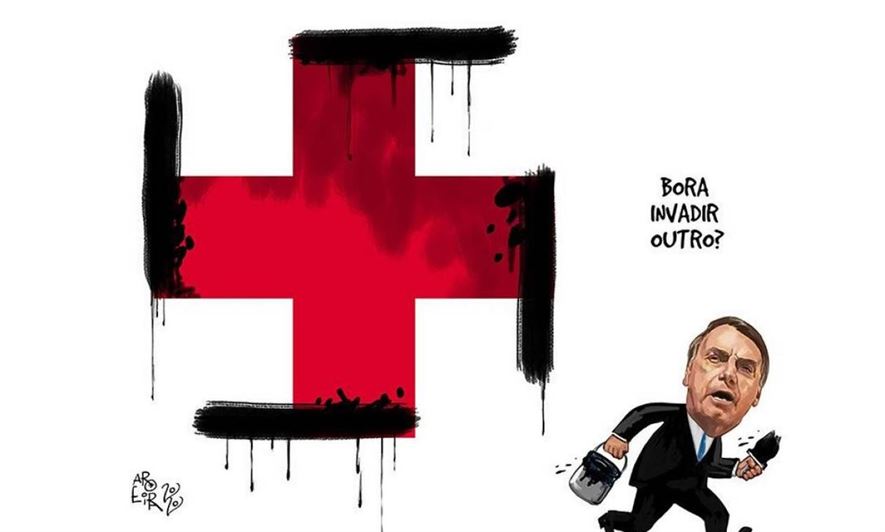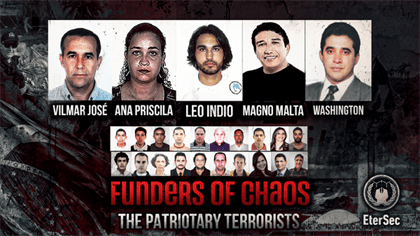Captain Covid
The text below is a lecture, entitled Brasilien: Der neue Faschismus?, delivered on May 2, 2019, at the Volksbühne Berlin, within the Democracy Lecture series, sponsored by the German journal Blätter für Deutsche und internationale Politik, in whose pages it was published in issue 64, June 2019. It was later republished as a chapter in the book Strongmen, organized by Vijay Prashad (Milano: Nottetempo, 2019), and as a booklet, Brasile, un nuovo fascismo? (Roma: Castelvecchi, 2020). I have made a few modifications to update the text.
President Jair Bolsonaro, called "myth" by his followers, prides himself on being a man of the past. In one of his speeches, he declared that the goal of his government is to make Brazil "similar to what we had 40, 50 years ago" - a clear reference to the period between 1964 and 1985, when the country was under the thumb of a violent military dictatorship. Homophobic, racist and misogynist, Bolsonaro reaffirmed in his inauguration his commitment to "liberate" Brazil from "socialism, the inversion of values and political correctness", and to "reestablish ethical and moral standards" based on family principles, "the foundation of our society".
Former Army captain and federal deputy for seven legislatures (i.e., for 28 years), Bolsonaro was an obscure character in Brazilian politics until he emerged, in mid-2017, as a candidate for the Presidency of the Republic, at the head of an unknown Social Liberal Party (PSL), which then had a single representative in Congress, and boasting a confusing government program that mixes ultraliberalism in the economy, nationalism in politics - "Beloved homeland Brazil" is the slogan of his government - and ultraconservatism in customs.
Perhaps the most evident characteristic - and the one that best explains Bolsonaro's ideas - is his deep resentment, something that seems to guide him in all his attitudes, a kind of revenge against society for its mediocrity, which identifies him even more to the "common man". Bolsonaro evokes the military order and was himself an insubordinate officer; he evokes the family model and has five children from three different marriages; he evokes religion - his motto is "Brazil above all and God above all" - and sometimes he presents himself as a Catholic, sometimes as an Evangelical, according to convenience; He sells himself as a champion of morality and gets himself and his family entangled in accusations of corruption and involvement with militia (paramilitary organizations linked to crime); he portrays himself as anti-politician and has made a living as a professional politician - a career, by the way, embraced by his four adult children, whom he calls 01, 02, 03 and 04...
The Beginning of Everything
At the beginning of April 1970, during the military dictatorship, the Brazilian Army's intelligence service obtained, through torture, information about the installation of a training center of the extreme-left-wing group Vanguarda Popular Revolucionária in Vale da Ribeira, one of the poorest regions of the state of São Paulo. Thus, on the 21st of that month, around five thousand soldiers, including Army and Military Police men, were deployed there, initiating a huge operation to capture the guerrillas. They blocked roads, flew helicopters over the thick forest, and bombed suspected areas by plane. The result was the arrest of 120 people, among them two guerrillas - eight others escaped mixed in with the population.
On the morning of May 8, after intense shooting, the seven remaining guerrillas, under the command of former Army Captain Carlos Lamarca, managed to break through a barrier set up in the city of Eldorado, starting an epic escape that would only end with the arrival, 41 days later, of five of them in São Paulo. Lamarca would later lead a series of actions against the military dictatorship - among them the kidnapping of the Swiss ambassador Giovanni Bucher, released after more than a month, in exchange for the liberation of 70 political prisoners taken into exile in Chile - until he was killed in the backlands of Bahia, on September 17, 1971.
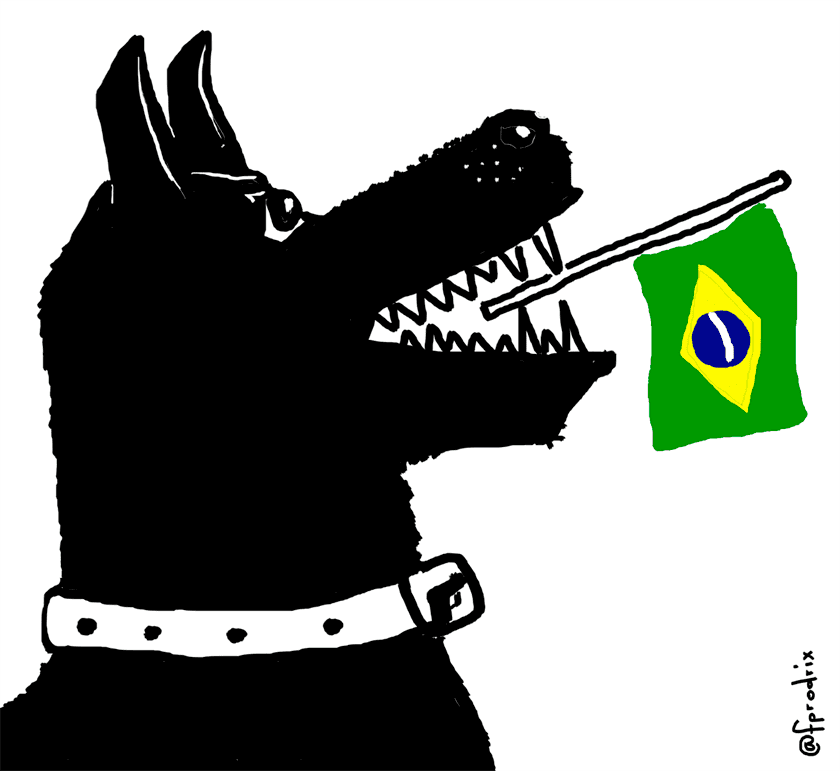
The presence of military troops in the region made a deep impression on the residents of Eldorado. Some even actively participated in the operation, serving as guides in the jungle and supplying information about the movements of the guerrillas. Among them was an enthusiastic and shy fifteen year old teenager, "astute and stubborn", nicknamed Palmito, because he was white and long, named Jair Bolsonaro. A friend from that time, Cidenei Alves, remembers that they used to talk to the soldiers, ecstatic with the weapons they were shown. This episode would determine Bolsonaro's future. According to another friend, Celso Leite, he started saying that he was going to be president of Brazil, and, as the presidents, in his view, were all military, he decided to join the Armed Forces.
Messias
Jair Messias Bolsonaro was born in Glicério, a tiny town in the interior of São Paulo state, on March 21, 1955, and spent part of his childhood wandering with his family from town to town until they settled in Eldorado. Third of six siblings, he was supposed to be called just Messias, because his mother, Olinda Bonturi, attributed his birth to a miracle, after a complicated pregnancy, but his father, Percy Geraldo Bolsonaro, added Jair to his name, a tribute to Jair da Rosa Pinto, at the time a famous player for Palmeiras, the favorite team of the Italian community. Bolsonaro descends from a family originally from Anguillara Veneta, in the province of Padua, the Bolzonaro.
His mother was a housewife and his father a prosthetic. Although he had no training in dentistry, Percy Geraldo made fillings and dentures and extracted teeth, which led to his being indicted by the police in 1973 for the illegal practice of his profession. Two years later, he was booked and monitored by the repressive organs of the military dictatorship for his involvement with the MDB, the only permitted opposition party. Percy Geraldo was "bohemian", but "energetic", as his son Renato recalls: "He liked to drink and smoke, but he didn't allow his children to smoke and drink". His mother admits that Jair was not very close to his father. Ironically, Percy Geraldo Bolsonaro ended up lending his name to the military college in Duque de Caxias, Rio de Janeiro state, inaugurated on December 17, 2018, after Bolsonaro was already elected president...
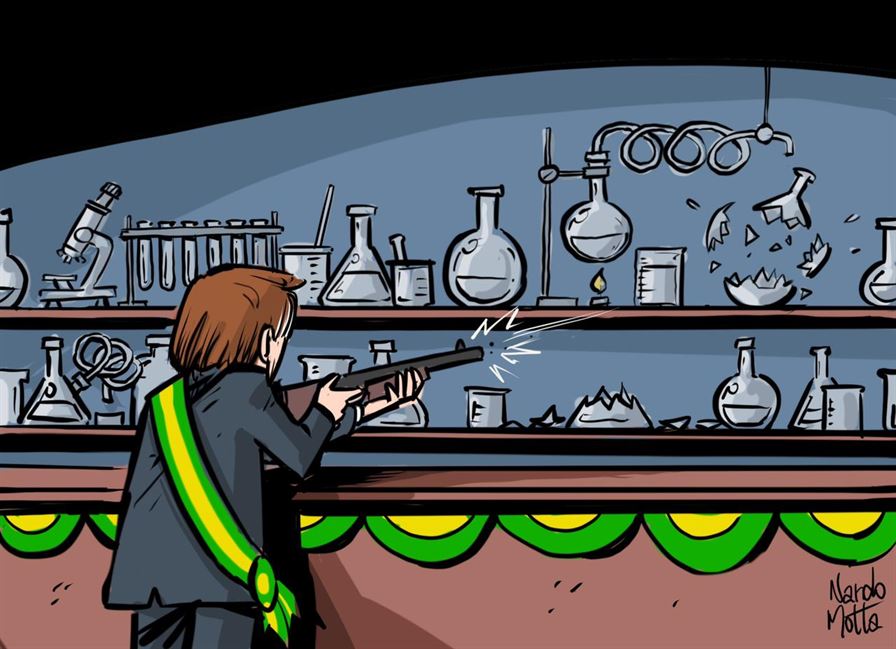
Coming from a poor family, Bolsonaro, "one of the most obstinate people I've ever met", in the words of his childhood friend Gilmar Alves, started studying "twenty-four hours a day", aiming to enter the Army Cadets Preparatory School, based in Campinas, São Paulo state, a goal he achieved at the age of 18. Soon after, he entered the Military Academy of Agulhas Negras, in Resende, state of Rio de Janeiro, where he graduated in 1977. From then on, he served, as an officer, in field artillery and parachute groups of the Army, until he was elected councilman in the city of Rio de Janeiro, in 1988, being then transferred to the paid reserve with the rank of captain.
"Bad military"
Although fascinated by uniforms, weapons, order and authority - he loves to pose with his thumb and forefinger cocked, simulating that he is shooting - Bolsonaro was not well regarded by his superiors in the Army. In 1983, when he was 28 years old and a lieutenant, Colonel Carlos Alfredo Pellegrino, in a statement to the Directorate of Registration and Evaluation of the Army Ministry, said that Bolsonaro "had the permanent intention of leading subordinate officers, in which he was always repelled, both because of the aggressive treatment dispensed to his comrades, and the lack of logic, rationality and balance in the presentation of his arguments.
In 1986, during the redemocratization process of the country, Bolsonaro was arrested for fifteen days, accused of "serious transgression" for writing, in the weekly magazine Veja, on September 3rd of that year, an article complaining about the low salaries paid to the military. A year later, on October 27, 1987, the magazine reported the existence of a plan, called Operation "Dead End", led by Bolsonaro, which consisted of a series of explosions, with low-power bombs, in bathrooms of military barracks to protest against low salaries. In a new story, on November 1st, the magazine displayed a sketch showing the place where a bomb would be placed in the Guandu pipeline, which supplies water to the city of Rio de Janeiro, made by Bolsonaro in his own handwriting.
The Military Justification Council, convened on April 19, 1988, unanimously found Bolsonaro guilty, requesting that "his incompatibility for the oficialacy and consequent loss of rank and patent" be "declared. The case was taken to the Military Superior Court, which, in a trial held in June of that year, accepted the thesis of Bolsonaro's defense, according to which the documentary evidence was insufficient because it did not allow handwriting comparisons, since handwriting was used in the sketch, absolving him, despite the existence of a handwriting report proving his authorship. Taking advantage of the great prestige achieved, especially among the families of the low-ranking military, in the same year Bolsonaro began his political career.
Colonel Jarbas Passarinho, minister in several departments during the military governments of Generals Costa e Silva, Emílio Garrastazu Médici and João Figueiredo, and even in Fernando Collor's civilian government, confessed, in an interview on March 31, 2011, that he had never supported Bolsonaro, because he was "a radical": "And I can't stand radicals, including right-wing radicals". General Ernesto Geisel, Brazil's dictator between 1974 and 1979, in a statement to political scientist Maria Celina d'Araújo and anthropologist Celso Castro, collected between July 1993 and April 1994, and released in a book in 1997, a year after his death, said that Bolsonaro was "completely out of the ordinary", including a "bad military man".
Barracks
As a kind of psychoanalytical compensation for his troubled life in the barracks, when former Captain Jair Bolsonaro became President of the Republic he placed hierarchically superior officers under his orders. In addition to his vice president, Hamilton Mourão, there are another 6,000 military personnel occupying management or advisory positions in ministries and government departments.
A military graduate during the dictatorship, which he denies ever existed, Bolsonaro has a real paranoia about "communists" - a category that involves all those who disagree with his thinking. In a speech on October 21, 2018, shortly after the announcement that he would run in the second round against Fernando Haddad, the candidate of the Workers' Party (PT), Bolsonaro told his supporters that they represent "the real Brazil": "This country is ours. It is not of this gang that has a red flag and a washed head." And for him, the focus of communist subversion is clearly embedded in the education system. His former Minister of Education, Abraham Weintraub, was an enthusiastic fighter against "cultural Marxism," defined by his predecessor in the portfolio, Ricardo Vélez Rodríguez, as "a materialist ideology, alien to our most cherished values of patriotism and religious vision of the world.
The guru
Bolsonaro's intellectual guru is a self-proclaimed "philosopher and writer," Olavo de Carvalho, whose Facebook profile exceeds half a million followers. Before becoming the mentor of the Brazilian far right, this ultra-conservative Catholic and staunch anti-communist had been an astrologer and a member of Tariqa, an esoteric Muslim sect, as well as having had a stint in a psychiatric hospital. A rabid Trumpist, Carvalho holds some unbelievable views: he questions global warming, evolutionism, vaccination, and heliocentrism; he says there is no such thing as fossil fuel; he denies that cigarettes are a cancer-causing agent; he associates AIDS with homosexuality; he condemns abortion under any circumstances; he defines feminism as a "mental illness"; and so on. But Carvalho's main contribution is the incorporation by Bolsonaro's government of his theses on "globalism".
In an article in the weekly Época, published on October 13, 2017, Carvalho explains his thoughts thus: "The idea of a world administration, global, unified, is very old. One of the projects of these people: eliminate cars with drivers. This is only possible if you connect everyone to a central source. Whoever has possession of this source will know where everyone is going and at what time. Another: eliminate paper money. With financial operations done electronically, you have total control over the population's economic life. According to Carvalho, to succeed in this endeavor, the "globalist elite" needs to dissolve the power cells that would try to resist this project, the main one being the family. One weapon of destruction of the family would be the dissemination of "cultural Marxism". "In Gramsci's [Italian philosopher Antonio Gramsci] strategy, most of the militancy involved did not go out preaching communist ideas. Rather, it was attacking specific points that represented pillars of civilization, such as the very idea of family, sexual morality, and the foundations of criminal and civil law." If citizens don't believe in anything they become easily controllable by the globalist elite, concludes Carvalho.

Evangelicals
On May 12, 2016, while in Brazil the Senate approved the opening of impeachment proceedings against President Dilma Rousseff, in Israel Jair Bolsonaro was baptized in the waters of the Jordan River by Assembly of God pastor Everaldo Dias Pereira, president of the Christian Social Party (PSC), the party to which he was affiliated at the time. Although Bolsonaro continues to claim to be Catholic, his current wife, the third, Michele Reinaldo, is an evangelical (a denomination that in Brazil refers mainly to Pentecostal and Neo-Pentecostal fundamentalism), a frequenter of the Attitude Baptist Church, and the marriage of both was celebrated in 2013 by Pastor Silas Malafaia, of the Assembly of God. Malafaia is, according to Forbes magazine, the third largest fortune among pastors in Brazil - $150 million. First place goes to Edir Macedo, leader of the Universal Church of the Kingdom of God, with an estimated fortune of $950 million, and second place goes to Valdemiro Santiago, of the Worldwide Church of the Power of God, with $220 million. All, including the fourth and fifth place in the ranking - RR Soares, of the Grace of God International Church, and Estevam and Sônia Hernandes, of the Renascer em Cristo Church - have declared their support for Bolsonaro.
Evangelical churches today represent about 30% of the Brazilian population - an astonishing growth, since 50 years ago they did not even reach 10% - and own a vast communication empire (their own television and radio networks, printed newspapers, and news websites). According to a study by the National Film Agency, 21% of all open television programming in Brazil is dedicated to religious proselytism. In the 2018 election, evangelical churches elected 91 congressmen (82 federal deputies and nine senators, including Eduardo and Flávio Bolsonaro, the president's sons) and the so-called Evangelical Parliamentary Front, which brings together, in addition to evangelicals, Catholics and Protestants, comprises almost a third of the 594 congressmen. "The Front is constituted mainly to preserve the interests of the monogamous family formed by man and woman," explains Representative Lincoln Portela (PRB-MG), a neo-Pentecostal pastor and one of the leaders of the Front.
Conservatism
In his inauguration speech on January 1, 2019, Bolsonaro ratified his commitment to defend an ultraconservative agenda, which includes issues such as valuing the traditional family, combating gender ideology, facilitating the carrying of weapons, and the implementation of the School without Party ("schools capable of preparing children for the labor market and not for political militancy," in his words). In less than ten minutes, he quoted God six times. Before joining the PSL, the acronym for which he was elected, Bolsonaro had already passed through seven groups (PDC, PPR, PPB, PTB, PFL, PP, PSC), and his parliamentary performance was always poor. In November 2019, he announced he was leaving the PSL and founding an association called ApB (Alliance for Brazil), which curiously emulates the name of the German far-right party, AfD (Alternative für Deustschland)...
According to a survey by the newspaper O Estado de S. Paulo, in 28 years of activities in the House of Representatives, Bolsonaro presented 171 bills and constitutional amendment proposals (PECs) - 57% of them contemplating military interests or related to public security. However, he managed to approve only two bills - one extending the benefit of exemption from the Tax on Industrialized Products for computer goods and another authorizing the medicinal use of phosphoethanolamine, a substance known in Brazil as the "cancer pill", which tests have shown to have no effect on the disease - and a PEC that provided for the printing of votes from electronic ballot boxes, an idea barred by the Supreme Court (STF) - and which later became the motto of his coup preaching.
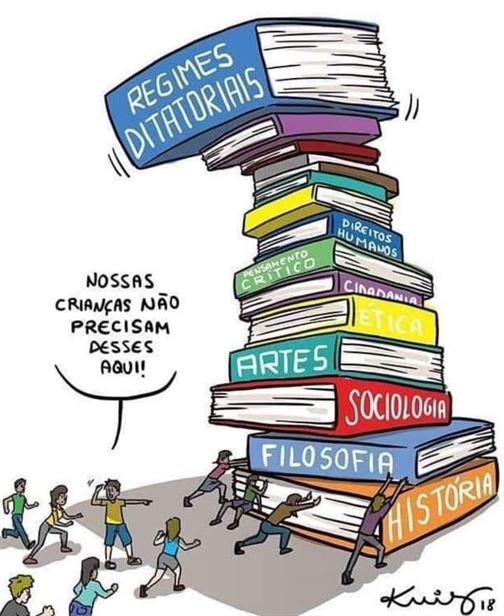
Bolsonaro ran for the presidency of the House of Representatives three times, in 2005, 2011, and 2017, losing all of them. In the last one, in February 2017, a year and a half before becoming president, he obtained only four votes, placing last among six competitors. Although discredited among his peers, Bolsonaro was gaining visibility among the population with controversial opinions, further boosted by his hawkish performance on social media - mirroring the strategy of his idol, Donald Trump. Thus, in some way, he captured, incorporated and consolidated the deeply reactionary side of Brazilian society, shaping his political-ideological platform.
A survey conducted by Ibope, at the request of the National Confederation of Industry, released in March 2018, showed that for eight out of ten voters, the most important thing of all is that the candidate of predilection believes in God. Another study, conducted by the Brazilian Public Security Forum, released in April 2018, indicated that Brazilian society, on a scale of zero to ten, reaches a score of 8.1 on the Index of Propensity to Support Authoritarian Positions. And the World Economic Forum, which meets annually in Davos, Switzerland, found in 2017 that among the 137 countries that make up its Global Competitiveness Index, Brazil ranked last in the "Public Trust in Politicians."
Climbing
Bolsonaro's rise from lackluster federal deputy to president of the Republic is intertwined with the gradual broadening of anti-Petista sentiment in society, fueled by the so-called Lava-Jato Operation, an investigation into corruption in public agencies during the government of Luiz Inácio Lula da Silva (2002-2010). The demonstrations of June 2013, with their diffuse agenda of demands and lack of leadership, mark the beginning of the polarization of Brazilian society, which would intensify in 2014 with the very tight reelection of Dilma Rousseff (51% of the valid votes) and the protests against the World Cup. Stimulated by an inquisitorial campaign of the large press conglomerates and by fake news in social networks, the protests of the yellow-green shirts against the PT would eventually result in the impeachment of Dilma in 2016, a parliamentary coup sponsored by the traditional right.
However, with several of its leaders also involved in corruption allegations, the traditional right, even with the prestige of former president Fernando Henrique Cardoso, was unable to gather a strong name to oppose Lula da Silva, who appeared in all polls as the voters' favorite. Taking advantage of this empty space, the former captain and "anti-politician" Jair Bolsonaro presented himself as the candidate "against all that is there," promising, with his extreme and simplistic speech, "hierarchy and discipline to achieve order and progress." In January 2018, Bolsonaro already emerged in second place in the electoral race. The problem was that, even under heavy fire, Lula remained unbeatable in all the projections of the research institutes.
On April 5, five months before the elections, the federal judge at the time, Sérgio Moro, responsible for judging the cases of Operation Lava-Jato, issued an order for Lula's arrest on charges of passive corruption and money laundering, ordering him to immediately serve his 12-year sentence - even though the matter was the subject of extensive legal controversy. While in prison, Lula continued to lead in the polls - in August he had 39% of voting intentions against 19% for Bolsonaro. On September 6, the former captain was stabbed in the abdomen in the interior of Minas Gerais, an episode that was never fully clarified, which caused an enormous commotion in an electorate already very sensitive to the radicalization of the election. Today it is known that Moro, in charge of Operation Lava-Jato, committed countless illegalities in the process, striving, in a partisan way, for the criminalization of Lula - decisions that were annulled by the Supreme Court in March of this year.
After losing several appeals to the STF in an attempt to free Lula from prison, which only occurred in November 2019, the PT launched the candidacy of Fernando Haddad, former mayor of São Paulo, an unknown name to the general public, on September 11, five days after the attack against Bolsonaro. The first poll conducted after the new events - conducted on September 20 - already showed Bolsonaro in the lead with 28% of voting intentions and Haddad in second place with 16%. At this point, the elections became a passionate contest between anti-Petro voters and voters opposed to the theses defended by Bolsonaro. In the end, Bolsonaro was elected with 55% of the valid votes - equivalent to 39% of the total electorate, expunging the null and white votes and abstentions - and Judge Sergio Moro became his Minister of Justice and peer eminence until April 2020, when he stepped down from the government.
Ultraliberalism
During the electoral campaign, Bolsonaro, confessing his ignorance in terms of economics, anticipated that he would give carte blanche to Paulo Guedes, an economist graduated from the University of Chicago, disciple of the thinker Milton Friedman, and one of the founders of the Millennium Institute, an organization inaugurated in 2005 under the sponsorship of large companies in industry, agribusiness, commerce, the press and the financial system, with the purpose of disseminating the ultraliberal ideological primer. Considered as a kind of super-minister of Bolsonaro, in his inauguration speech Guedes stated: "After thirty years of center-left political alliance, now there is an alliance between conservatives, in principles and customs, and liberals, in economics".
A point defended as a "value" by the Millenium Institute is that of meritocracy, "rewarding individual effort", which sounds ironic in a country considered to be one of the ten most socially unequal in the world. But Bolsonaro is an unconditional fan of meritocracy. Committed to deconstructing the important advances made under the PT governments (2002-2016) in the field of affirmative policies, Bolsonaro thinks that "whoever uses a quota is signing below that he is incompetent," as he said in an interview on April 4, 2012 to TV Bandeirantes. He calls affirmative policies "coitadism": "Poor black people, poor women, poor gays, poor Northeasterners. Let's end it," he roared on October 23, 2018, in an interview with TV Cidade Verde. In the countryside, Bolsonaro warned that he would paralyze the already morose agrarian reform and that he would criminalize as "terrorism" the actions of the Landless Workers Movement (MST), whose members he calls "bandits." Bolsonaro also made it clear that, under his government, "not a single centimeter will be demarcated for indigenous or quilombola reserves," according to a statement on April 3, 2017, at Rio de Janeiro's Hebraica Club.
The ultraliberal agenda in the economy and ultraconservative in customs brought Bolsonaro closer to the leader of the new extreme right, the American Steve Bannon, strategist of Trump's victorious campaign, and creator of The Movement, an organization that propagates the guidelines of the so-called "alternative right" in the world. On August 4, 2018, one of Bolsonaro's sons, Eduardo, a federal deputy for São Paulo, met with Bannon in the United States and wrote on his twitter: "We had a great conversation and shared the same worldview. He said he is an enthusiast of Bolsonaro's campaign and we are certainly in touch to join forces, especially against cultural Marxism. On November 27 of that year, Eduardo attended Bannon's birthday party in the company of his friend Filipe Martins, a follower of Olavo de Carvalho, and who considers Trump's former strategist "genius" - Martins became Bolsonaro's advisor for international affairs.
The Spanish journalist Javier Lafuente described the similarities between the strategies used by Bolsonaro's team and Bannon's for Trump's campaign in the newspaper El Pais: "Use of crude language at zero cost. Continuous criticism of traditional media, while building his own and making unparalleled use of social networks to achieve his ends. In all cases, he excels with a nationalist component and a cult of personality that surpasses that of his rivals. Like Trump in the campaign, Bolsonaro has also made use of his children as spokespeople."
Dynasty
Bolsonaro's preaching of hate and intolerance - "These red marginals will be banished from our homeland," he said, referring to the opposition, on October 21, 2018 - has guaranteed continuity within his own clan: his three adult children already have solid political careers and all share with their father the far-right ideology. Children of Bolsonaro's first marriage - to Rogéria Nunes Braga -, they launched themselves early into politics, broke popularity records, and actively participate in their father's decisions, interfering in all government affairs, whether through interviews, comments on social networks, or directly influencing the formulation of public policies.
The oldest of the sons, Flávio, the 01, born in 1981, was elected senator in 2018, with 4.4 million votes, after four consecutive terms as a state deputy in Rio de Janeiro, and today has his name linked to the practice of corruption and link with militiamen. Carlos, the 02, born in 1982, considered the "pit bull of the family," at 17 was already on the City Council of the city of Rio de Janeiro, the youngest elected councilman in the history of Brazil, re-elected in 2016 as the most voted in those elections - again re-elected in 2020, with 70,000 votes. Eduardo the 03, born in 1984, was re-elected in 2018 by the state of São Paulo, being the most voted federal deputy in the history of Brazil, with 1.8 million votes.
Bolsonaro still has two more children, from two other marriages. From his troubled relationship with Ana Cristina Valle - which includes death threats, fleeing abroad, and requesting asylum - Renan was born in 1998, who presents himself, in his Facebook profile, as "right-wing, law student, and part of the future of the nation." Laura was born from his marriage to Michelle Reinaldo, in 2010: "I have five children. There were four men, and then on the fifth I gave in and a woman came along," he confessed on April 3, 2017.
This, our private monster, is the one who is leading Brazil to a dead end...
